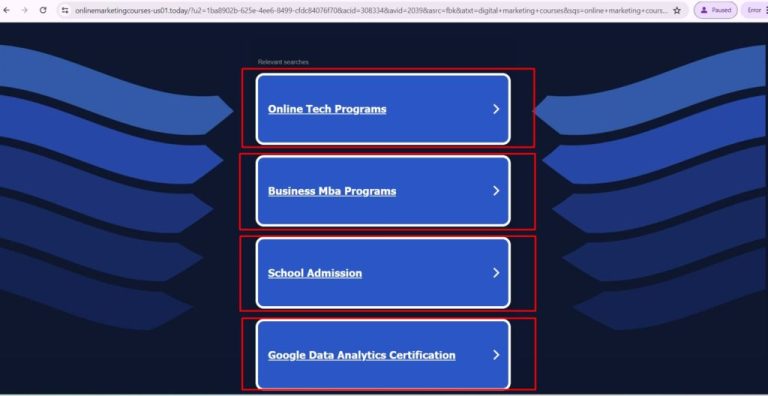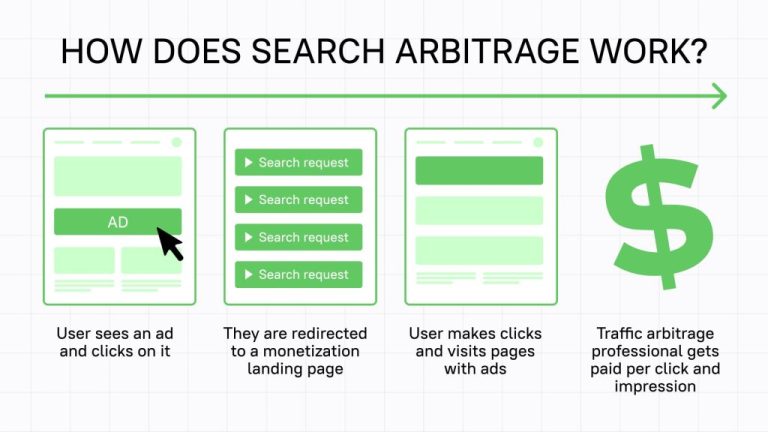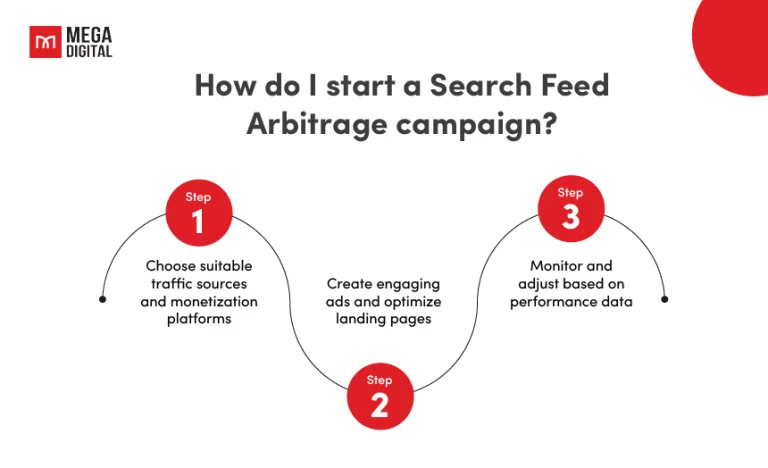Search Arbitrage Media Buyer Jobs
Ever noticed how buying and selling ad space feels a bit like being in the fast lane of a bustling marketplace? In the dynamic world of Search Arbitrage Media Buyer Jobs, you’re essentially the puppet master, pulling strings behind the stage to maximize ad revenues. It’s like a modern treasure hunt for clicks, where every decision impacts the bottom line in real-time.
The role of a Search Arbitrage Media Buyer has become pivotal since the advent of online advertising in the late 90s. Today, it’s a strategic game of numbers and creativity, where swift analytics combine with innovative ad placements. You’ll find that optimizing ad spend has never been more critical, with industry peaks showing a remarkable increase of 20% effectiveness through skilled arbitrage methods.

Search Arbitrage Media Buyer Jobs: An Overview
In the digital world, Search Arbitrage Media Buyers play an exciting role. They purchase online ad spaces and resell them at a profit, much like a digital marketplace. The goal is to buy these spaces at a lower cost and then sell them for more, maximizing returns. This job might sound simple, but it requires a sharp mind to track market trends and stay ahead. It’s a bit like solving a puzzle where each piece affects your overall profit.
Every day in this job is different, filled with challenges and opportunities. Media buyers need to be constantly learning and adapting. They analyze data, measure ad performance, and adjust strategies. This ensures that every ad dollar is spent wisely. The right moves can lead to great profits, while wrong ones might mean losses.
One of the main skills needed is deep knowledge of digital marketing platforms. They use tools like Google Ads and Facebook Ads to manage campaigns and track performance. Other necessary skills include strong analytical abilities and quick decision-making. It’s like being a detective, finding clues and making decisions based on evidence. Each decision impacts your next steps and potential profit.
The future is bright for media buyers, as more businesses go digital. As the online ad market grows, so does the demand for skilled buyers. They help companies reach the right audience and achieve their marketing goals. This job is not only about buying ads but creating value. It’s about connecting brands with the right viewers in clever and efficient ways.
Role and Responsibilities
As a search arbitrage media buyer, your day revolves around purchasing ad space wisely. You don’t just buy any space; you select those that promise the best returns. This involves researching market trends and spotting opportunities where ads can perform well. It’s a strategic game where every decision counts. You aim to make the best choice based on available data and insights.
Your responsibilities extend to managing and optimizing ad campaigns. You examine how ads are performing and tweak them to improve results. Here, being fast and responsive is key. If a campaign isn’t working, you need to identify why and fix it quickly. This ensures every ad dollar maximizes profit.
Another important role is tracking and reporting. You keep a close eye on metrics such as click-through rates and conversion. Maintaining detailed reports helps you identify patterns and make informed decisions. This information is valuable for future campaigns, guiding what works best. It also provides a clear view of overall performance.
Collaboration is a big part of the job too. You often work with marketing teams to align ad strategies with broader goals. Communication skills are crucial here, as you share insights and suggest improvements. Working together ensures that every campaign contributes to business objectives. It’s a team effort where every member plays a crucial role.
The Skills Required for Search Arbitrage Media Buyer Jobs
Being a search arbitrage media buyer means you need to have certain skills to succeed. One important skill is analytical thinking. You need to interpret lots of data every day, drawing meaningful patterns from it. This helps you make smart decisions about where to place ads. The better your analysis, the more successful your campaigns will be.
Strong negotiation skills are also essential. You’ll often negotiate prices for ad space to get the best deals. This requires confidence and communication skills. Being persuasive can help you secure spaces that others might miss. Ultimately, this skill directly impacts how much profit you can make.
Keeping up with technology is crucial too. Media buyers use various software tools for managing and optimizing campaigns. Proficiency in platforms like Google Ads or Facebook Ads is often necessary. These tools help track performance and adjust strategies. Staying current with tech developments ensures you maintain a competitive edge.
Creativity should not be overlooked. Crafting captivating ad messages requires a creative flair. This skill enables you to create ads that stand out and attract clicks. Combining creativity with data insights helps form effective campaigns. It’s the blend of art and science that turns potential viewers into customers.
The Challenges Faced in Search Arbitrage Media Buying
One major challenge in search arbitrage media buying is the rapidly changing market. Trends shift quickly, and what’s popular one day might not be the next. This requires constant monitoring and quick adaptation. Missing out on these changes can lead to ineffective campaigns. Staying up-to-date is crucial to staying ahead of the competition.
Another hurdle is the high level of competition. Many companies are vying for the same ad spaces, making it tough to stand out. This fierce competition can drive up prices, cutting into potential profits. You need to be strategic in picking where to place your ads. Creative solutions and unique tactics often give you the edge over others.
Technology can also pose challenges despite its benefits. While tools like Google Ads help manage campaigns, they constantly update with new features. Keeping up with these updates and mastering new functions can be time-consuming. Not adapting quickly can impact campaign effectiveness. Regularly updating skills in using these tools is essential.
Budget management is a challenge that can’t be ignored. Allocating funds wisely ensures you get the most out of your ad spend. Overspending can quickly erode potential profits, while underspending might limit reach and performance. It’s about finding the sweet spot where investment meets returns. Balancing this requires a careful and thoughtful approach.
The risk of fraud is another concern. Not all ad spaces provide genuine value; some may generate fake clicks. Identifying fake traffic and ensuring real engagement is key to maintaining campaign integrity. Employing verification tools helps in detecting fraudulent activities. It protects your investments and ensures your campaigns achieve real results.
Finally, measuring performance accurately can be tricky. With so much data available, finding meaningful insights can be daunting. Properly tracking and analyzing metrics is vital for understanding what works. Effective measurement guides future campaign strategies and adjustments. It also helps prove the value of your efforts, ensuring continued investment.
The Earning Potential of a Search Arbitrage Media Buyer
Search arbitrage media buyers can find themselves on varying levels of the income ladder. Their earnings largely depend on experience, skills, and the size of the campaigns they manage. Entry-level positions might start with modest salaries. However, with expertise and results-driven success, earnings can significantly increase. This reflects the critical role that media buyers play in maximizing ad revenue.
Bonuses are a common part of compensation packages for skilled media buyers. Achieving specific performance targets often results in financial incentives. This motivates buyers to continually improve and refine their strategies. The more effective a buyer becomes, the more likely they are to earn these bonuses. Thus, a performance-based pay structure encourages ongoing professional growth.
Some media buyers work freelance, managing campaigns for multiple clients. This can significantly boost their earning potential, allowing them to take on a variety of projects. However, this path can be unpredictable, with income varying month to month. Success depends on building strong client relationships and delivering consistent results. Freelancers often enjoy the flexibility that comes with this work style.
According to industry reports, the average salary can vary widely based on location and company size. In certain regions, buyers earn a premium for their expertise. A table below provides a general idea of salary ranges:
| Experience Level | Estimated Annual Earnings |
|---|---|
| Entry-Level | $40,000 – $60,000 |
| Mid-Level | $60,000 – $80,000 |
| Experienced | $80,000 – $120,000+ |
The future is promising for dedicated media buyers. With digital marketing continuing to expand, opportunities for growth and increased earnings are plentiful. Those who keep pace with trends often find themselves well-compensated for their expertise. Innovative strategies and strong analytics skills help media buyers stand out. As demand grows, so will earning opportunities in this dynamic field.
Future Prospects in Search Arbitrage Media Buying
Search arbitrage media buying is evolving rapidly, opening new opportunities. With the internet continuing to grow, the demand for effective ad placement is increasing. This means more roles for media buyers who can navigate the digital landscape. The future looks promising, with many businesses shifting more of their marketing efforts online. As such, skilled media buyers will be crucial in driving successful campaigns.
Innovation in technology continues to reshape the industry. Tools for data analysis and campaign management are becoming more sophisticated. This change requires media buyers to continually adapt and learn. Staying current with these technologies keeps you ahead of the curve. Those who embrace these tools will find themselves at an advantage.
The growth of social media platforms provides another avenue for media buyers. Social media offers rich data on user preferences and trends. With this information, media buyers can tailor more effective campaigns. The demand for ads on platforms like Instagram and TikTok is on the rise. This trend offers exciting new prospects for those in the field.
As the industry grows, so does the competition. Media buyers will need to differentiate themselves with creativity and strategic thinking. The ability to think outside the box can set you apart. This creativity leads to campaigns that capture attention and drive engagement. In a crowded market, unique strategies are more valuable than ever.
Big data and artificial intelligence are also influencing the future of media buying. These technologies offer new ways to predict trends and analyze behavior. Media buyers who harness these tools can optimize their strategies. It’s a chance to enhance accuracy in targeting and campaign outcomes. The future of media buying is exciting and full of potential.
Lastly, the role of sustainability in advertising is emerging. Companies are looking for ways to make their marketing more environmentally friendly. Media buyers play a part by choosing green ad options. This trend is likely to continue, creating new paths for innovation. Keeping this in mind can boost your relevance in an ever-evolving industry.
Key Takeaways
- Media buyers thrive on purchasing low-cost ad spaces for profit.
- You need strong analytical skills to understand digital trends.
- Maximizing returns involves optimizing and strategizing campaigns constantly.
- Platforms like Google Ads are essential tools in your toolkit.
- The role demands creativity and adaptability in changing markets.
Frequently Asked Questions
In the world of search arbitrage media buying, many people have questions about how it works, the skills needed, and the future prospects. Here are some common questions with detailed answers to help you understand better.
1. What is a Search Arbitrage Media Buyer’s main goal?
The main goal of a search arbitrage media buyer is to maximize profit by strategically purchasing and selling ad spaces. They find cheap ad spaces and try to resell them at a higher price, turning a profit in the process. This involves analyzing data to identify opportunities where ads can perform well.
In addition to spotting opportunities, the job also requires constant optimization and strategy adjustments. By continuously evaluating performance, media buyers can tweak their campaigns to ensure they squeeze the most out of every advertisement dollar spent, thus maximizing returns.
2. How do media buyers choose which ad space to buy?
Media buyers choose ad space based on data and audience targeting. They consider factors such as who the intended audience is and where they spend their time online. This helps ensure that ads are placed in locations that reach potential customers effectively.
The decision is influenced by cost as well, seeking to buy low and sell high. The process also includes negotiating the best deals for ad space, ensuring the chosen spots align perfectly with their marketing goals and budget constraints.
3. What skills are vital for success in media buying?
Key skills for media buyers include analytical thinking, creativity, and negotiation. Analytical skills help in interpreting data effectively while negotiation ensures getting the best deals. Creativity is essential to craft compelling ad messages that engage the target audience.
Moreover, media buyers should be tech-savvy to use platforms and tools needed to manage campaigns. This includes being comfortable using analytics software and online advertising platforms to track and improve the results of campaigns.
4. Why is creativity important in search arbitrage media buying?
Creativity is crucial because it helps in designing engaging ads that grab attention. A creative approach in crafting ad content can differentiate a product or service from competitors, making it more appealing to the audience.
Furthermore, creativity aids in problem-solving by thinking outside the box to overcome challenges. In a crowded and competitive ad space, inventive and original strategies can lead to more impactful advertising results.
5. What challenges do media buyers face in this field?
Media buyers face challenges like market fluctuation and competition for ad space. These elements make choosing the right ad space tricky, as costs can change rapidly. Keeping abreast of changes in market trends and adapting to them is necessary to stay competitive.
Another challenge is ensuring the accuracy of tracking ad performance given the risk of fraudulent clicks in digital ads. Media buyers need to use robust tracking tools to ensure every advertisement is delivering genuine, profitable traffic.
Conclusion
As a search arbitrage media buyer, your potential is vast. You navigate the digital landscape with a mix of creativity and data-driven decisions. By continuously honing your skills, you can unlock significant earnings and play a vital role in the digital marketing ecosystem. The industry’s evolution offers endless opportunities for those ready to adapt and innovate.
Looking ahead, embracing new technologies and strategies will be your path to success. The future is bright if you’re willing to embrace and drive change. By staying curious and responsive to the shifting market dynamics, you ensure a rewarding career full of challenges and achievements.







